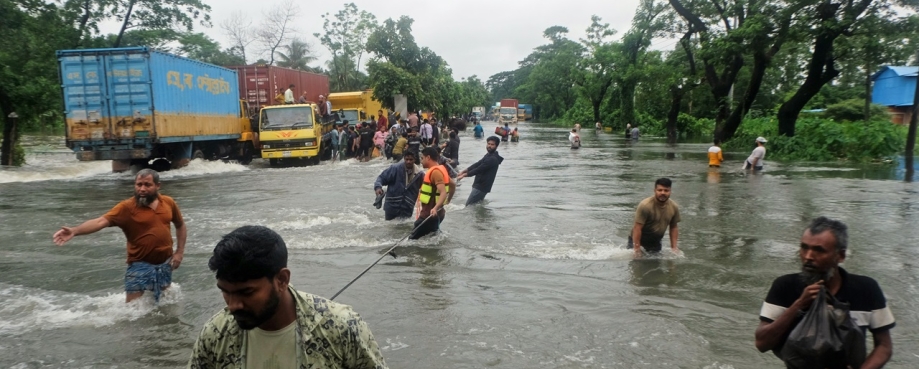
More than 5 million people have been affected by floods in Bangladesh. With almost 300,000 forced to flee their homes, as flood water inundated vast areas of the country on 21 August.
While monsoon rains cause widespread disruption and destruction on an annual basis in Bangladesh, the climate crisis has seen an increase in the severity and frequency of these weather events. Deadly landslides have occurred following the heavy rainfall, with a cyclone set to follow in the coming days.
These events come weeks after a student-led movement toppled its government, adding challenges for the interim government as it finds its feet. Steps are being taken to mobilise expertise and resources from national and international NGOs, while ordinary Bangladeshis step in to crowdfund relief efforts.
"In recent times we have seen the frequency and scale of annual river floods intensifying due to climate change. As flood water recedes urgent support is required to mitigate risks to health and food shortages for people stranded in affected areas. It is also crucial we step up our climate adaptation measures, which will require goodwill and support from our international partners.”
Abil Amin, Country Manager, ETI Bangladesh
Implications for workers and supply chains
Damage to power lines has left over 800,000 people without electricity in recent days, preventing communications with affected areas. Highways and railway lines have been damaged and submerged, between Dhaka and the main port city of Chattogram, making access to badly flooded districts difficult and disrupting businesses.
As a result, exporters have been unable to transport goods creating further setbacks for Bangladesh’s garment industry, a key driver of the country’s economy. While the Dhaka-Chattogram highway is now back up and running, Chattogram port faces increased, if temporary, risks of congestion and backlog of containers. Manufacturers have urged the government to arrange for exports via alternative routes (including the ports at Panagon and Mongla) to meet pending deadlines and relieve pressure on supply chains.
While factories appear largely unaffected, workers may be directly or indirectly impacted by flooding; with families residing in affected areas and many forced to migrate in the wake of flood destruction.
Our recommendations
While impact of these floods on the transportation of finished goods is expected to be temporary, the devastation faced by affected communities may be long term. These developments follow weeks of political and social upheaval for Bangladesh. This combination of events underscores the importance of responsible business conduct in Bangladesh, helping to provide stability and security for workers and suppliers at a time of change and in the era of climate crisis.
Our recent joint recommendations for responsible business conduct in the country remain fully relevant. These developments emphasise the need for businesses to undertake enhanced human rights due diligence and to implement responsible purchasing practices in this challenging context.
Just transition
As business adapts to such extreme weather events, steps must be taken to understand and mitigate adverse impacts on workers. The climate crisis will continue to drive extreme weather events, with significant impacts for low-lying countries such as Bangladesh. Climate adaptation strategies must be developed with a human rights lens and in consultation with workers and their representatives, to ensure a just transition.
“In spite of commitments made in Paris in 2015, global greenhouse gas emissions continue to rise. And despite its own low per-capita emissions, Bangladesh is at the forefront of the resultant climate crisis. The flooding of recent days is yet another of glaring example of the devastating price Bangladeshi citizens are paying for the inaction of the major polluting countries. As the world’s great and good gear-up for COP29 in Baku Azerbaijan in little more than two months’ time, just transition must be at the centre of their preparations – a transition that is fair, inclusive, leaves no-one behind, and is based on genuine social dialogue with workers, their representatives and other affected communities.”
George Williams, Just Transitions Advisor, ETI
